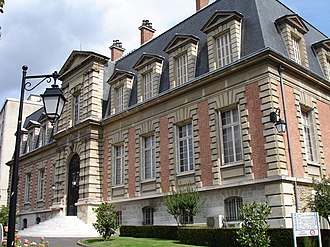Pasteur Institute
The Pasteur Institute is one of the world's leading basic research centers for biology and medicine, with its headquarters in Paris . It was founded on June 4, 1887 and named after its founder, the well-known researcher Louis Pasteur .
In addition to its research activities, it advises the French government and the World Health Organization (WHO) on medical issues. It deals with the development and research of diagnostic and test procedures in medicine . The institute is an epidemiological monitoring center and controls outbreaks of infectious diseases worldwide.
organization
In 1966 the institute was reorganized. A scientific committee was established and research centers and teaching as well as production and marketing were separated from one another. The French state now provides 41% of the funding, and a third of the income comes from the institute's activities. Around 26% come from gifts and bequests. The institute has a 4 year term elected president, currently Stewart T. Cole . The President is supported by a Vice President for Administration and Finance. A board of directors consisting of 21 members acts as a supervisory body, 5 of whom are ex officio and 16 are elected.
Well-known researchers
The founder, Louis Pasteur, was a pioneer in the field of microbiology. Émile Roux gave the world's first lecture in microbiology in 1888 . He and Alexandre Yersin found u. a. the diphtheria toxin .
In 1921, the discovery of the vaccine against tuberculosis by Albert Calmette and Camille Guérin led to an expansion of the institute.
Jean Laigret (1893–1966) developed the first vaccination against yellow fever in 1932 . In 1936 Daniel Bovet made significant contributions to research into the anti-infection effects of sulfonamides .
Pierre Lépine developed (1901-1989) in 1954 one of the world's first polio - vaccination .
In 1983, Luc Montagnier and his research group isolated the pathogen causing the immune deficiency disease AIDS, known as the HI virus, for the first time and discovered HIV-2 two years later.
Researchers at the institute have been awarded the Nobel Prize for Medicine seven times :
- 1907: Alphonse Laveran
- 1908: Ilya Ilyich Metschnikow
- 1919: Jules Bordet
- 1928: Charles Nicolle
- 1957: Daniel Bovet
- 1965: François Jacob , Jacques Monod and André Lwoff
- 2008: Luc Montagnier and Françoise Barré-Sinoussi
Pasteur institutes worldwide
The first Pasteur Institute outside Europe was founded in Saigon in 1891 .
The also very well-known Institut Pasteur Brussels in Belgium, originally Institut Antirabique et Bactériologique du Brabant , was founded in 1900 by the Brabant Provincial Council. The Nobel Prize winner Jules Bordet , coming from the Institut Pasteur Paris, was the first director of the institute. From January 1, 1995, it was subordinate to the Belgian Federal Ministry for Social Affairs, Health and Environment. In 1996 it merged with the Scientific Institute for Public Health .
Today the Pasteur Institute has a network of 32 affiliated institutes:
- Abidjan , Cote d'Ivoire
- Algiers , Algeria
- Athens , Greece (since 1919)
- Bangui , Central African Republic
- Brussels , Belgium
- Bucharest , Romania
- Casablanca , Morocco
- Cayenne , French Guiana
- Dakar , Senegal
- Ho Chi Minh City , Nha Trang and Hanoi , Vietnam
- Hong Kong University - Pasteur Research Center, Hong Kong , China
- Lille , France
- Montevideo , Uruguay
- Montréal , Canadian Pasteur Foundation, Canada
- New York , Pasteur Foundation, USA
- Niamey , Niger
- Nouméa , New Caledonia
- Phnom Penh , Cambodia
- Pointe-à-Pitre , Guadeloupe
- Saint Petersburg , Russia
- Seoul , South Korea
- Shanghai , China
- Antananarivo , Madagascar
- Tehran , Iran : Pasteur Institute of Iran
- Tunis , Tunisia
- Yaoundé , Cameroon
Web links
- Homepage
- Annales de l'Institut Pasteur in Gallica , the digitization project of the Bibliothèque nationale de France
Individual evidence
Coordinates: 48 ° 50 ′ 25.4 " N , 2 ° 18 ′ 38.9" E



